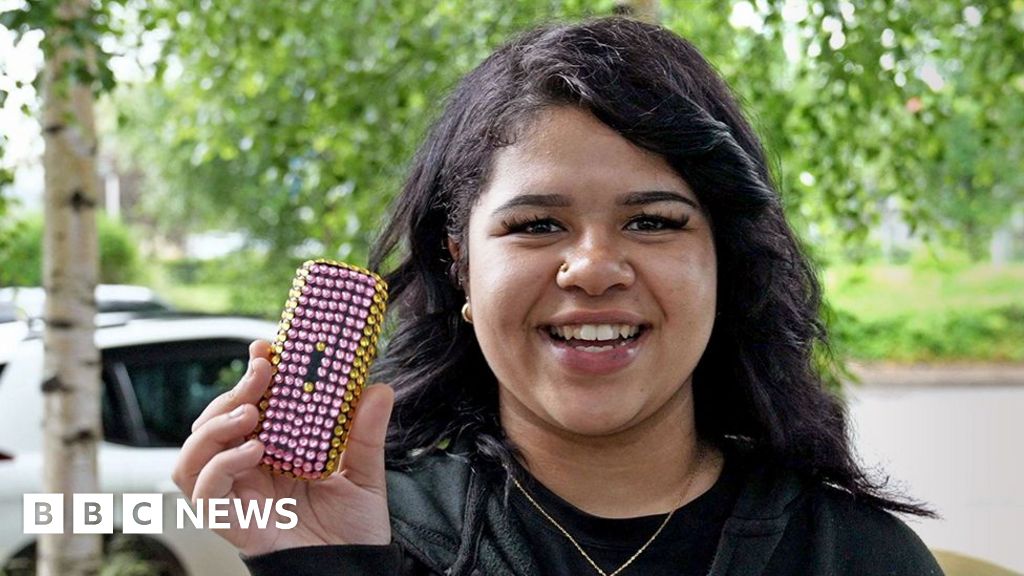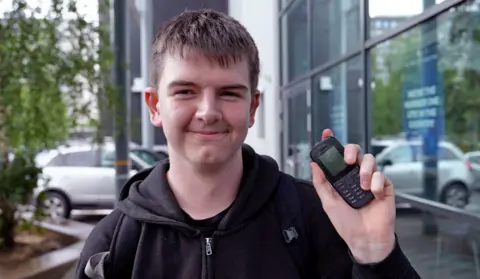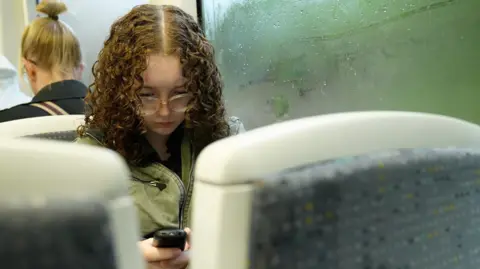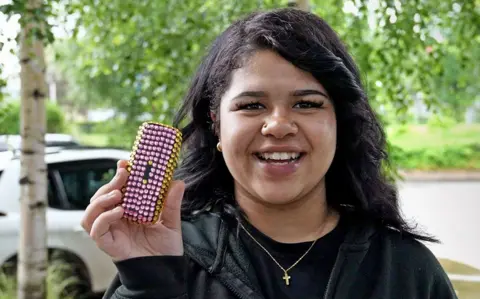What happened when 10 teens gave up their smartphones?

By Kristian Johnson, BBC News
 BBC News/Kristian Johnson
BBC News/Kristian JohnsonAs part of a five-day digital detox, 10 Salford teenagers swapped their devices for basic phones that can only make calls and send texts. How did they get on?
Will regularly spends more than eight hours a day staring at his smartphone.
When he was younger, he used to love riding his bike – he’s 15 now and spends most of his free time after college scrolling through TikTok videos.
Last week, Will clocked up 31 hours on social-media apps alone. But for the next five days, he will have no access to social media.
“I’m worried how I’ll cope,” he says. “I’ll now have to be sociable with my parents.”
The detox is part of a BBC project looking at young people’s smartphone habits – and Will is one of 10 students at Media City’s University Technical College who have agreed to trade in their phones for a basic Nokia handset.
Almost every aspect of the students’ lives will be affected – they’ve grown up with smartphones and use the internet for everything. They communicate mainly on Snapchat or Facetime, use Google Maps rather than A-Zs, and are always streaming music on-the-go.
It’s going to be a “real challenge”, says college principal Colin Grand, who is locking the students’ devices away for the duration of the experiment.
Ruby dreams of becoming an actor. She says she spends way too much time on her phone, and often ignores her parents while scrolling through TikTok.
Midway through the experiment, I visit her family.
When I arrive, the 16-year-old is putting the finishing touches to her make-up before she heads to college.
Her father checks she has her work uniform in her bag and then Ruby’s mother drives us to the tram stop.
Ruby acknowledges that having a break from her smartphone “has opened up more conversation” with her parents – and her mum, Emma, agrees the detox is having a positive impact on her daughter’s behaviour.
“Ruby is pretty addicted to her phone, so it just gives her a chance to see what it was like when I was a teenager,” says Emma.
“She’s talking more and she’s going to bed earlier. It’s a nice break.”
As we approach the barriers at the station, we can see the tram already pulling away.
Usually, Ruby would check an app on her phone to find out when the next tram will arrive. Reading timetables on the display board at a tram stop is not something this generation does.
“Without a phone, I’ve got no way of knowing,” she says.
While we wait for the next tram, Ruby tells me about her part-time job at a centre for group Nerf games. She works a couple of times a week – but isn’t entirely sure if she has a shift later today, or how long it will be.
Her manager has given her the office telephone number in case she needs to clarify her hours – but she feels “a bit nervous” about calling.
“It shows you on the app what shift you’re doing, but I don’t know that now,” explains Ruby. “I never call work, ever.”
She pays for her tram ticket – her bank card‘s getting some rare use without access to her smartphone wallet – and we set off on the hour-long journey.
 BBC News/Kristian Johnson
BBC News/Kristian JohnsonFor some of the teens, giving up their smartphone has been really difficult.
After just 27 hours, 14-year-old Charlie has dropped out and asked for his device back.
“I knew my phone was in the same building,” he says, but not knowing if someone was trying to get in touch with him and not being able to go online was “really stressful”.
Another thing that seems to be stressing everyone out is the status of their Snapstreak – a running total of how many days they have sent Snapchat messages to each other.
Some students admit they are so concerned about losing the streak – which can sometimes last more than 1,000 consecutive days – they have asked friends to log into their accounts and keep them going during the detox.
Like Charlie other students taking part in the experiment acknowledge a fear of missing out, but most say they are surprised at how liberating they are finding the experience.
Some are getting better sleep, they say, while others feel they have been more productive without their phones.
“I feel like I’m learning stuff and engaging more – I don’t feel like I’m missing out on anything,” says Grace, 15.
Straight after school, on the first day of the experiment, she and her friends went to buy plastic jewels to “gem-up” her brick-phone.
Showing it to me as we chat, Grace says the shopping trip was a good distraction from thinking about her locked-away smartphone – and it had another unexpected benefit.
“It was really peaceful” she says. “I really enjoyed it because it got my creative flow back.
“As soon as I got home, I was drawing stuff and painting. It helped kickstart off finding the things that I like again.”
 BBC News/Kristian Johnson
BBC News/Kristian JohnsonIn February, the government published new guidance to try to stop pupils using phones during the school day.
But a group of cross-party MPs went one step further in May, saying an outright ban on smartphones for all under-16s – not just at school – should be brought in by whoever wins the general election.
In a survey of 2,000 13 to 18-year-olds, conducted by BBC Radio 5 Live and BBCBitesize, young people were asked about various aspects of life – including mental health and their smartphone habits.
The findings of the survey, carried out by polling company Survation, suggest:
- 23% agree that smartphones should be banned for under-16s
- 35% think social media should be banned for under-16s
- 50% say not having their smartphone on them makes them feel anxious. Last year, this figure was slightly higher (56%)
Simply taking part in this digital detox has set these teens apart from their contemporaries. In the BBC survey, 74% of young people polled said they would not consider swapping their smartphones for a basic device.
After five long days, it’s time for the students to be reunited with their smartphones.
Excitement levels are high as a teacher walks over to the college safe to retrieve them. Several students scream with anticipation.
As soon as they’ve turned their phones back on, the teenagers are glued to their screens – scrolling and catching up on group chats.
But most say after taking part in the detox, they would like to find ways to limit their screentime.
“It’s made me realise how much time I spent on social media, and I’ve realised I need to cut down on it and go out more,“ acknowledges Will. “I’ll try and use less of TikTok, that’s for sure.”
He admits it’s been difficult, and he’s particularly missed listening to music. But time away from his phone has allowed Will to reignite his passion for cycling – something he’s determined to continue instead of spending endless hours scrolling.
“Eight hours a day is just crazy,” he says.
Related
Youth football teams hold minute’s silence for 10-year-old Poppy Atkinson
Youth football teams and grassroots clubs across the country have held a minute’s silence at the start of their games to commemorate a 10-year-old girl who di
Girl’s death sparks minute’s silence at football matches nationwide
10-year-old Poppy Atkinson was killed when she was struck by a car during a training session at Kendal Rugby Club in Cumbria. Clubs from Leeds to London
Liverpool fans’ Uefa claim can be heard in England, judge…
The high court, sitting in Liverpool, heard Uefa had relied upon the principle that English courts will not inquire into the legality of actions by foreign gove
Alan Shearer’s Premier League predictions including Manchester United vs Arsenal
Caption: Alan Shearer?s Premier League predictions credit: Getty / Metro After some impressive results for English sides in Europe the focus is













